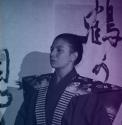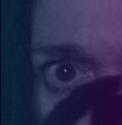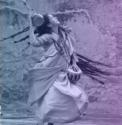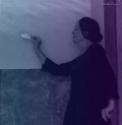Margaret and Me - A personal reflection
A brief personal reflection to remember Margaret Cameron and to mark the end of the 49 days of the Buddhist bardo.
I first met Margaret in 2002 at a meeting in Melbourne hosted by the late Helen Sharp. My aim was to introduce Jill Greenhalgh and the Magdalena Project to local Melbourne women theatre-makers. Margaret arrived late and in a state: her son had had an accident in her car. I was surprised to find her a little shy. Already several people had suggested that if we were to invite a Melbourne artist to our 2003 festival it should be Margaret Cameron. Despite her circumstances and her state I found her magnetic. Our meeting that evening was brief but unforgettable. I remember nothing of what was said, only her presence, remarkable even in reticence. A year later she was performing her acclaimed solo Knowledge and Melancholy at the Brisbane Powerhouse as part of Magdalena Australia: Theatre, Women, Travelling.
Knowledge and Melancholy enthralled and confounded me. After seeing it that first time I could not have told you what it was about, only that I had been deeply affected. Something resonated and I wanted to understand her poetry and her practice. Carelessly forsaking earlier collaborators I was compelled to approach her at the bar and asked her to direct my solo Heroin(e). Thus began our long conversation about practice, a conversation that over time deepened and broadened to include all of our living and thinking and feeling. Margaret Cameron became one of my best friends.
As our conversation progressed I discovered Margaret Cameron had been part of my genealogy of performance practice since the early 1990s. She had performed in Jenny Kemp’s Call of the Wild, a performance I saw when studying at Victorian College of the Arts. In those student years it was Kemp’s Call of the Wild, Théâtre de Complicité’s Three Lives of Lucie Cabrol, and discovering the work of Taduez Kantor that forever changed my idea of what theatre was and could be. To my utter surprise I had also seen Things Calypso Wanted to Say! which Margaret performed at the Malthouse. I will never forget how the sound of her breath became the sea, or how she knelt in front of the young playwright in the front row and pinned him to his seat with an erotically charged address. I had never seen a woman performer so bold, so personal and so in control of her material – philosophically, poetically, practically. I remembered the performance, but not her name, nor even her face. It was her voice I remembered.
For days after she died I heard her voice in my ear, a dry chuckle. Heh, heh, heh.
Margaret had a knack for using the unusable, making the impossible possible, and for finding poetry in the everyday. She insisted on Beauty and on Thrift. Her searing orange house by the sea is a gallery of found objects and op-shop treasures. The first time I travelled to her home to live and to work she threw all my collected papers, brochures and writings in the air and proposed we proceed with the perceptual practice: what if where I am is what I need?[1] I picked up a piece of paper that had fallen and read: “Rules are for protection. Rules do not exist to deny you pleasure. Rules exist to protect you from pain.” It was a pamphlet from the Drug and Alcohol Rehab unit at the Royal Brisbane Hospital. Re-contextualised, these words became the opening lines of Heroin(e). When I was making No Door On Her Mouth – a lyrical amputation Margaret found a piece of scrap-paper that had fallen out of my bag. On it I had scrawled the words I crave poetry. This chance discovery amplified my craving, and shifted the performance towards a new poetics of form. These are two tiny examples of how Margaret would notice and use everything. She was so alive to her environment and to her collaborators.
My solo Heroin(e) premiered in 2007 at The Transit Festival and then had a 2008 season at the Perth Institute of Contemporary Art as part of a double-bill with Margaret’s the proscenium. M went on to be directorial and dramaturgical consultant on my PhD performance No Door On Her Mouth – a lyrical amputation (2010). Between 2009 and 2012 she collaborated with me and Julie Robson and five other artists on Ladyfinger’s Falling Like A Bird. My doctoral study pays tribute to our association throughout this time, articulating a number of conversational threads about practice. For those interested these have been foregrounded in an article titled “Can we meet? Talk? Love? Create something together?” which is forthcoming in online feminist journal Outskirts (February 2015).
I loved being directed by M because she would ask me to do impossible things, and I think she enjoyed directing me because I would try to do everything she asked. In the end, the most impossible thing she asked me to do was to read aloud her poem Lay Me Out so that she could hear if she was satisfied with the punctuation. Lay Me Out is a 49-stanza farewell – one for each day of the Buddhist bardo. I read to her through my tears and found the moments of levity. Afterwards she said with unwavering wry humour, “You were a mess. I don’t know why someone didn’t stop you!”
The 49 days of the bardo have just passed. If you believe in reincarnation then M’s soul has traversed an intermediate stage and is ready to re-enter this world and have another shot at life. This is not my belief, but I wanted to mark day 49 as an end to my own liminal state of formal mourning. I will always miss Margaret. I will always hear her voice. She tells me often to write it down…
The last time I visited M and laid on her bed and held her hand she said: “All I have ever really taught is that it is okay to care deeply about something, and it doesn’t matter what, it doesn’t matter what it is. That’s all. And I have taught it over and over again.” I wrote it down. And then she said: “You should do Knowledge and Melancholy.”
I still hear her voice. In my ear. She is chuckling. I half-smile too, shake my head slightly, and close this reflection with these lines that I will now begin to learn – because I cared deeply about her person, because this work confounded and enthralled me, and because I have always enjoyed trying to do achieve her impossible suggestions:
The elephant said to the mouse:
You are very small.
The mouse said to the elephant:
I have been sick.
Do not expect me to be cheerful,
I am fighting for my life.
There are no words to describe loss of this dimension.
Even the mouse carries a great sorrow,
though her small voice would never pretend
it was the elephant’s pain,
and could the elephant in his bigness,
imagine how a tiny pain,
could burden an uncomplaining creature?
He imagines lowliness is a lack.
He sees the mouse as improbably small
and remarks on the essential
and elemental bearing of a small creature,
something a refined mind would understand
is not a topic of conversation.
The heroism of certain small individuals
should never be languaged by voyeurs.
The elephant has no right of passage here,
the mouse, perfectly bounded, describes her ‘why’
– the simple beauty of a modest point of view,
 Margaret Cameron: Falling Like a Bird 2010, Photograph by Lisa Businovski
Margaret Cameron: Falling Like a Bird 2010, Photograph by Lisa Businovski





